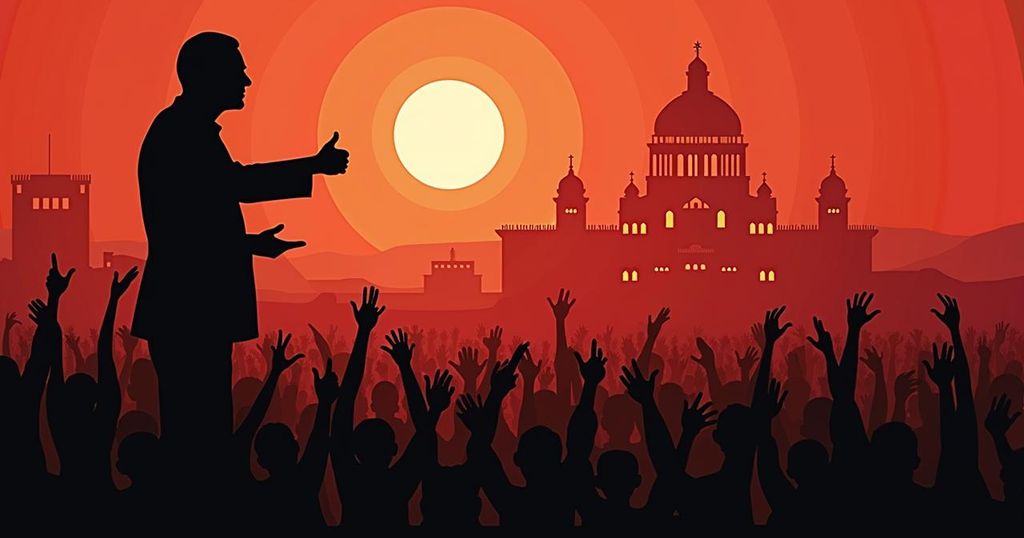Kais Saied Targets Second Presidential Term Amidst Election Controversies in Tunisia

Following a largely contested presidential election, President Kais Saied appears set to win a second term with about 89.2% of the vote amid low turnout of under 28%. Key challengers were excluded from the electoral process, with one rival imprisoned, further raising concerns over the integrity of the election. Tunisia has witnessed a regression into autocratic rule alongside a severe economic crisis, complicating democratic aspirations since the Arab Spring.
President Kais Saied appears poised to secure a second term following the conclusion of the presidential election in Tunisia, which has faced criticism from opposition groups regarding its fairness and integrity. Exclusions of significant contenders and the imprisonment of one rival have raised serious questions about the electoral process. An exit poll revealed that Saied garnered approximately 89.2% of the vote; however, the participation rate was alarmingly low at under 28%, marking the lowest turnout for a presidential election in Tunisia since the 2011 revolution. Saied’s main opponents included Zouhair Maghzaoui, a former lawmaker who initially supported Saied’s unilateral consolidation of power in 2021, but later decided to challenge him, reportedly receiving only 3.9% of the votes. The other contender, Ayachi Zammel, a largely unknown businessman, has been incarcerated for alleged electoral fraud, yet he attained about 6.9% support, reflecting a curious increase in his popularity amidst his imprisonment. Prominent political figures from larger opposition parties remain either imprisoned or barred from candidacy, with Saied controlling the electoral commission that governs the election process. Tunisia, having initially emerged as a beacon of democratic transition post-Arab Spring, has regressed under Saied’s administration. He assumed office in 2019 but has since dismantled democratic institutions, including dissolving the parliament and amending the constitution to establish an authoritarian regime. A report by Human Rights Watch has noted the detention of over 170 individuals for political reasons and for exercising basic rights, a trend indicative of the current political landscape. Despite the anticipated outcome favoring Saied, he dismisses allegations of undermining democracy, labeling his opposition as traitors. His tenure has not only been marked by political strife but also an increasingly severe economic crisis characterized by shortages of basic goods, high unemployment rates, and soaring inflation. The government’s hesitance to implement austerity measures necessary for securing an IMF loan complicates the economic situation. Tunisia’s economy relies heavily on a resurgence of tourism and financial aid from the European Union, contingent upon stringent migration control policies.
The situation in Tunisia stems from the country’s struggle to balance democratic aspirations with autocratic tendencies that have resurfaced since the Arab Spring revolution of 2011. Initially hailed as a successful example of transitioning towards democracy after the overthrow of dictator Zine El Abidine Ben Ali, Tunisia has faced increasing political instability, particularly under President Kais Saied. His controversial decisions to dissolve the parliament, revise the constitution, and curtail electoral competition have alarmed many observers. The backdrop of significant economic hardship has exacerbated public discontent, complicating the reform agenda and threatening the democratic processes in place.
In summary, President Kais Saied’s anticipated re-election reflects a significant departure from democratic norms in Tunisia, as evidenced by widespread claims of unfairness in the electoral process and the exclusion of serious political challengers. His administration has been characterized by a regression into autocracy, compounded by the ongoing economic crisis that leaves Tunisia at a precarious crossroads. The electoral outcome, pending official confirmation, poses fundamental challenges for the future of democracy and governance in Tunisia, with many citizens facing dire economic realities under a leadership perceived as increasingly authoritarian.
Original Source: www.dw.com






